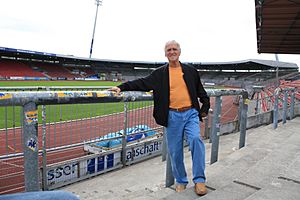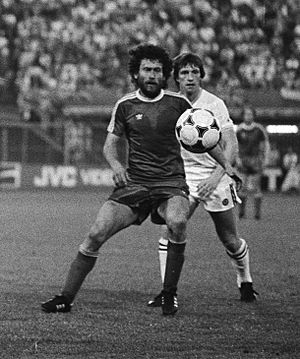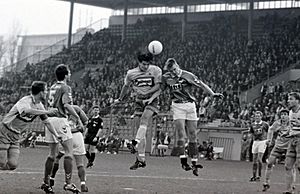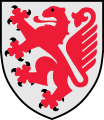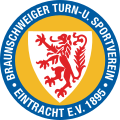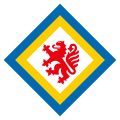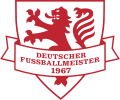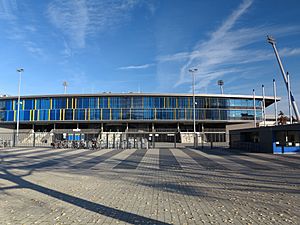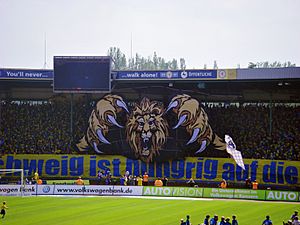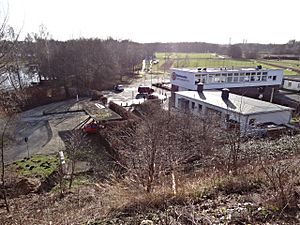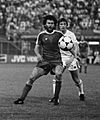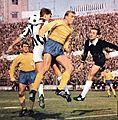Eintracht Braunschweig facts for kids
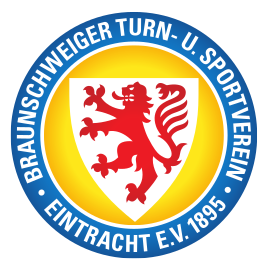 |
|||
| Full name | Braunschweiger Turn- und Sportverein Eintracht von 1895 e.V. |
||
|---|---|---|---|
| Nickname(s) | Die Löwen (The Lions) | ||
| Founded | 15 December 1895 | ||
| Ground | Eintracht-Stadion, Braunschweig |
||
| Capacity | 23,325 | ||
| President | Nicole Kumpis | ||
| Head coach | Heiner Backhaus | ||
| League | 3. Liga | ||
| 2020–21 | 2. Bundesliga, 17th of 18 (relegated) | ||
|
|
|||
Eintracht Braunschweig is a German football and sports club from Braunschweig, Lower Saxony. Their full name is Braunschweiger Turn- und Sportverein Eintracht von 1895 e.V. They are often called BTSV. The team plays in the 2. Bundesliga, which is the second-highest football league in Germany. Their home games are played at the Eintracht-Stadion, which can hold over 23,000 fans. They have played there since 1923.
The club started in 1895 as FuCC Eintracht 1895. They were one of the first clubs to form the German Football Association (DFB) in 1900. Before World War II, they won the Northern German Championship twice.
Eintracht Braunschweig was one of the original 16 clubs in the first Bundesliga season in 1963. Their best years were in the 1960s and 1970s. They won the Bundesliga title in 1966–67 and finished third in 1976–77.
After 1985, the club often moved between the second and third leagues. They faced money problems in the late 2000s. But they made a great comeback and were promoted back to the Bundesliga in 2013. This was after 28 years away from the top league. However, they only stayed for one season. Recently, they have continued to move between the 2. Bundesliga and the 3. Liga.
Eintracht Braunschweig is nicknamed Die Löwen, which means "The Lions". This comes from the red lion on their club badge. Their blue and yellow team colours come from the old flag of the Duchy of Brunswick. Their biggest rival is Hannover 96, and their games are known as the Lower Saxony derby.
Contents
Club History: From Founding to Today
How Eintracht Braunschweig Started
Eintracht Braunschweig began as a football and cricket club in 1895. It was first called FuCC Eintracht 1895. Later, its name changed to FC Eintracht von 1895 in 1906, and then SV Eintracht in 1920.
The team quickly became popular in northern Germany. In 1900, Eintracht Braunschweig helped create the German Football Association (DFB). They won the Northern German championship in 1908 and 1913. By 1914, three of their players were on the German national team.
During the 1942–43 season, Eintracht Braunschweig was one of the top teams. They won their league with an amazing record of 17 wins and 1 draw in 18 games. They scored 146 goals! They won their first national play-off game 5–1. But then they lost to Dresdner SC, who went on to win the championship.
Football After World War II
After World War II, all sports clubs in Braunschweig were temporarily combined into one new club called TSV Braunschweig. This happened on November 2, 1945. On April 1, 1949, the club officially became Braunschweiger TSV Eintracht von 1895, its current name.
The club continued to play in the top league, called the Oberliga Nord. They only spent one season (1952–53) in the second division. In 1949, their goalkeeper Gustav Fähland sadly passed away after being injured in a game. They also reached the final round of the national championship in 1958.
Bundesliga Era: 1963 to 1985
Eintracht Braunschweig was one of the 16 teams chosen to play in the new professional league, the Bundesliga, which started in 1963. They quickly found success, winning the national title in the 1966–67 season. They were known for their strong defense, letting in only 27 goals. This was a Bundesliga record for many years. Many players from the team also joined the national side during the 1960s and 1970s.
In 1973, Eintracht Braunschweig made history. They became the first Bundesliga team to have a sponsor logo on their jerseys. It was for the liquor company Jägermeister. This deal brought the team money and changed how football clubs did business. Other clubs soon started getting sponsors too. Jägermeister sponsored the club until 1987.
The club almost won a second title in 1977, finishing third. After that season, they signed Paul Breitner, a famous player who had won the World Cup in 1974. He joined from Real Madrid. However, he only played for one season before moving to Bayern Munich.
Challenges and Comebacks
Since the 1985–86 season, Eintracht Braunschweig has mostly played in the second and third divisions. They did return to the top league for the 2013–14 season. In 1987, they were relegated but set a unique record: they were the only team to be relegated with more goals scored than conceded.
Through the 1990s and 2000s, the club often moved between the 2. Bundesliga and the Regionalliga (third tier). In 2007–08, the club faced big financial problems. They were in danger of falling to the fourth division for the first time ever.
However, under new manager Torsten Lieberknecht, the team improved a lot. In 2010–11, they won the 3. Liga and were promoted back to the 2. Bundesliga. They continued to do well, and in the 2012–13 season, they earned promotion to the Bundesliga after 28 years!
They finished 18th in the 2013–14 Bundesliga season and were relegated again after just one year. In 2016–17, they almost returned to the Bundesliga, finishing third in the 2. Bundesliga. But they lost in the play-off games to VfL Wolfsburg.
On May 13, 2018, Eintracht Braunschweig was relegated to the 3. Liga. In 2018–19, they almost dropped to the fourth tier but managed to stay up. The next season, they were promoted back to the 2. Bundesliga. They were relegated again in 2020–21, but then quickly promoted back after finishing second in the 3. Liga.
Team Look: Colours and Crest
Team Colours
Eintracht Braunschweig traditionally plays its home games in blue and yellow. These colours come from the flag of the old Duchy of Brunswick.
|
|
|
|
|
Club Crest
The club's crest features a red lion on a white background. This symbol comes from the coat of arms of the city of Braunschweig. The city's symbol is based on the lion symbol of Henry the Lion. Over the years, the club badge has changed. Most of the time, it was a round badge in blue and yellow, with a red lion on a white shield in the middle.
In 1972–73, Eintracht Braunschweig changed its crest to look like the logo of its sponsor, Jägermeister. This helped them get around rules against shirt sponsors at the time. In 1986, after Jägermeister stopped sponsoring the club, Eintracht Braunschweig adopted a new diamond-shaped logo. This new logo still had the traditional red lion and the club's blue and yellow colours.
In 2011, club members voted to bring back the more traditional round crest. The new version was officially used starting in the 2012–13 season. For the 2016–17 season, the club wore a special anniversary crest. This was to celebrate 50 years since they won the Bundesliga title in 1966–67.
Home Ground: Eintracht-Stadion
Eintracht Braunschweig plays its home games at the Eintracht-Stadion in Braunschweig. This stadium was built in 1923. Today, it can hold about 23,325 people. In the 1960s, it could hold up to 38,000 fans. Before this stadium, the club played at Sportplatz an der Helmstedter Straße, which held 3,000 people.
Fan Support and Rivalries
Even when the club played in lower divisions, its fans have always been very supportive. In the 2011–12 season, Eintracht Braunschweig had one of the highest average attendances in Germany.
The club has friendly fan relationships with 1. FC Magdeburg, Waldhof Mannheim, and the Swiss club Basel. However, their biggest and longest-standing rivalry is with Hannover 96. Matches between these two teams are called the Lower Saxony derby.
Some people also talk about a rivalry with VfL Wolfsburg because they are close by. But fans of Eintracht Braunschweig and Hannover 96 usually say that only their games against each other are the true Lower Saxony derby.
Club Achievements: Honours
Eintracht Braunschweig has won several titles throughout its history.
- Bundesliga (Top League):
- Champions: 1966–67
- 2. Bundesliga (Second League):
- Runners-up: 1980–81, 2012–13
- 3. Liga (Third League):
- Champions: 2010–11
- Regionalliga Nord (Second League, old format):
- Champions: 1973–74
- Regionalliga Nord (Third League, old format):
- Champions: 2004–05
- Lower Saxony Cup:
- Winners: 2003–04, 2010–11
European Football Adventures
Eintracht Braunschweig has also played in European competitions.
| Season | Competition | Round | Nation | Club | Home | Away | Aggregate | Result |
|---|---|---|---|---|---|---|---|---|
| 1967–68 | European Cup | 1st round |
|
Dinamo Tirana | – | – |
|
Win |
| 2nd round |
|
Rapid Wien | 2–0 | 0–1 |
|
Win | ||
| Quarter-finals |
|
Juventus | 3–2 | 0–1 |
|
Loss | ||
| 1971–72 | UEFA Cup | 1st round |
|
Glentoran | 6–1 | 1–0 |
|
Win |
| 2nd round |
|
Atlético Bilbao | 2–1 | 2–2 |
|
Win | ||
| 3rd round |
|
Ferencváros | 1–1 | 2–5 |
|
Loss | ||
| 1976–77 | UEFA Cup | 1st round |
|
Holbæk B&I | 7–0 | 0–1 |
|
Win |
| 2nd round |
|
Español | 2–1 | 0–2 |
|
Loss | ||
| 1977–78 | UEFA Cup | 1st round |
|
Dinamo Kiev | 0–0 | 1–1 |
|
Win |
| 2nd round |
|
Start | 4–0 | 0–1 |
|
Win | ||
| 3rd round |
|
PSV | 1–2 | 0–2 |
|
Loss |
1 Juventus beat Eintracht Braunschweig 1–0 in a play-off game to reach the semi-finals. 2 Eintracht Braunschweig moved to the next round because they scored an away goal.
Team Players and Staff
Current Squad
|
|
Players on Loan
|
|
Famous Former Players
This list includes players who played many games for Eintracht Braunschweig or were part of their country's national team.
- Germany
 Joachim Bäse (1959–1973)
Joachim Bäse (1959–1973) Karim Bellarabi (2008–2011, 2013–2014)
Karim Bellarabi (2008–2011, 2013–2014) Paul Breitner (1977–1978)
Paul Breitner (1977–1978) Bernd Franke (1971–1985)
Bernd Franke (1971–1985) Wolfgang Grzyb (1966–1978)
Wolfgang Grzyb (1966–1978) Franz Merkhoffer (1968–1984)
Franz Merkhoffer (1968–1984) Walter Schmidt (1959–1969)
Walter Schmidt (1959–1969) Lothar Ulsaß (1964–1971)
Lothar Ulsaß (1964–1971) Horst Wolter (1961–1972)
Horst Wolter (1961–1972) Ronald Worm (1979–1987)
Ronald Worm (1979–1987)
- International Players
 Ihor Belanov (1991–1994)
Ihor Belanov (1991–1994) Ermin Bičakčić (2012–2014)
Ermin Bičakčić (2012–2014) Hasse Borg (1977–1983)
Hasse Borg (1977–1983) Daniel Davari (2009–2014)
Daniel Davari (2009–2014) Omar Elabdellaoui (2013–2014)
Omar Elabdellaoui (2013–2014) Sergei Fokin (1992–2000)
Sergei Fokin (1992–2000) Danilo Popivoda (1975–1981)
Danilo Popivoda (1975–1981) Damir Vrančić (2009–2016)
Damir Vrančić (2009–2016) Zhang Chengdong (2012–2013)
Zhang Chengdong (2012–2013)
Current Technical Staff
| Position | Name |
|---|---|
| Head coach | Heiner Backhaus |
| Athletic trainer | Rolf Berghauser |
| Goalkeeping coach | Ronny Teuber |
| Sporting director | Peter Vollmann |
| Physiotherapist | Florian Horn |
| Physiotherapist | Goce Janevski |
| Physiotherapist | Philipp Glawe |
| Club doctor | Florian Brand |
| Club internist | Simon Fitzner |
| Club internist | Andreas Düker |
| Club chiropractor | Dr. Alexander Ruhe |
| Team manager | Holm Stelzer |
| Kit and equipment manager/Bus driver | Christian Skolik |
Manager History
Here are some of the managers who have led Eintracht Braunschweig. Caretaker managers (who fill in temporarily) are shown in italics.
|
|
Club Records
- Biggest Home Win in Bundesliga: 6–0 against Rot-Weiss Essen (1977) and VfB Stuttgart (1975)
- Biggest Away Win in Bundesliga: 7–1 against Arminia Bielefeld (1972)
- Most Games Played (all competitions): 563 by Franz Merkhoffer (1968–1984)
- Most Goals Scored (all competitions): 116 by Werner Thamm (1950–1962)
- Most Goals Scored in a Bundesliga Season: 24 by Wolfgang Frank (1976–77)
- Most Goals Scored in a 2. Bundesliga Season: 30 by Ronald Worm (1980–81)
Youth Teams and Other Sports
Eintracht Braunschweig is a club that offers many different sports. Besides football, it has departments for athletics, basketball, chess, darts, field hockey, gymnastics, team handball, swimming, water polo, tennis, and winter sports. The club was very successful in athletics and swimming from the 1940s to the 1960s. Athletes from the club won over 40 national championships during that time.
Field Hockey Success
The field hockey team has been one of Eintracht Braunschweig's most successful parts. The women's field hockey team has won many titles, especially in the 1970s.
Field Hockey Honours
- Bundesliga (Women's Field Hockey):
- Champions: 1965, 1969, 1974, 1975, 1976, 1978
- German Women's Championship (Indoor):
- Champions: 1973, 1974, 1975
- EuroHockey Club Champions Cup:
- Runners-up: 1975, 1976, 1977
Basketball Team
Eintracht Braunschweig also has a basketball department, started in 1956. The club's women's team currently plays in the 2. Damen-Basketball-Bundesliga, which is the second division for women's basketball in Germany.
Images for kids
See also
 In Spanish: Eintracht Brunswick para niños
In Spanish: Eintracht Brunswick para niños
 | Delilah Pierce |
 | Gordon Parks |
 | Augusta Savage |
 | Charles Ethan Porter |


